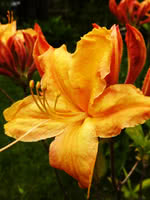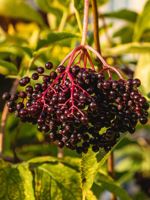Mon-Fri 9am - 5pm Mountain time
Golden Lights Rhododendron (Azalea) vs Bob Gordon Elderberry
Rhododendron x Golden Lights
Sambucus canadensis Bob Gordon
NOT AVAILABLE THIS SEASON - MIGHT RETURN
(we don't know if or when this product will be restocked)
Golden Lights Rhododendron is an exceptionally cold hardy, deciduous azalea. Part of the Northern Lights Series, this shrub was cultivated specifically to withstand harsh winters, making it ideal for our prairie climate.
In late spring you'll be drawn to its beautiful, golden, sweetly fragrant flowers. Pruning is recommended after the flowers are spent to control the size and shape of this shrub.
Consider Golden Lights Rhododendron when planning your next hedge, or plant it on its own as a striking specimen plant.
Bob Gordon Elderberry is a Black Elderberry cultivar that produces berries that are larger and sweeter than other varieties, making it one of the top cultivars. It produces large clusters of white flowers that turn into large clusters of dark purple to black berries. The berries are well-suited for baked goods, jams, jellies, and syrups. It was selected from the wild in Missouri.
The large berry clusters that the Bob Gordon Elderberry produces will often end up hanging downward. This makes it more difficult for birds to feed on the berries. If birds are a concern, this might be the right berry for you.
Black Elderberries are considered to be partially self-pollinating. So while they will still produce some berries without cross-pollination, planting with another variety will increase yields. Consider planting with Black Elderberry or Ranch Elderberry.
Warning: the seeds, stems, leaves, roots, and uncooked berries are toxic to humans when eaten in quantity. Berries should be cooked to make them safe for human consumption.
Golden Lights Rhododendron (Azalea) Quick Facts
Bob Gordon Elderberry Quick Facts
Toxicity: All parts of a rhododendron bush, including the leaves, stems and blooms, are toxic to cats, dogs, and horses.
Toxicity: leaves, stems, and uncooked berries are poisonous to humans

